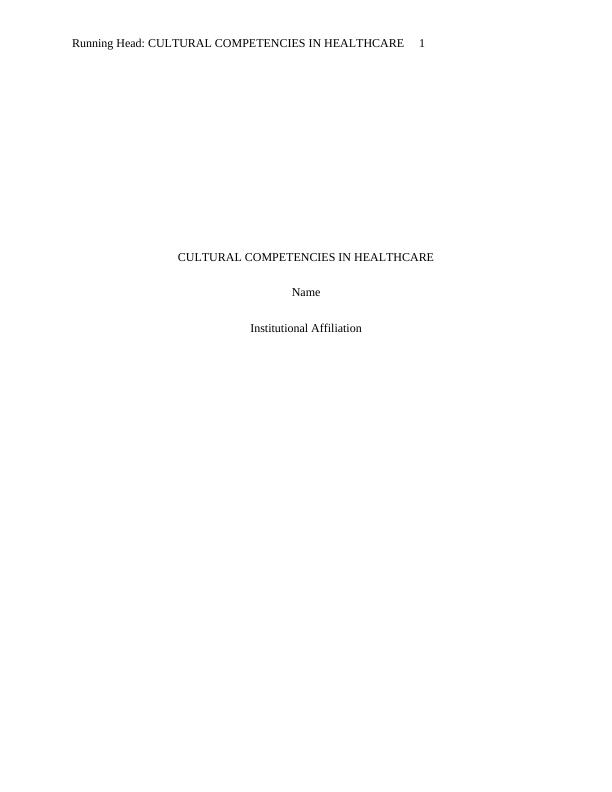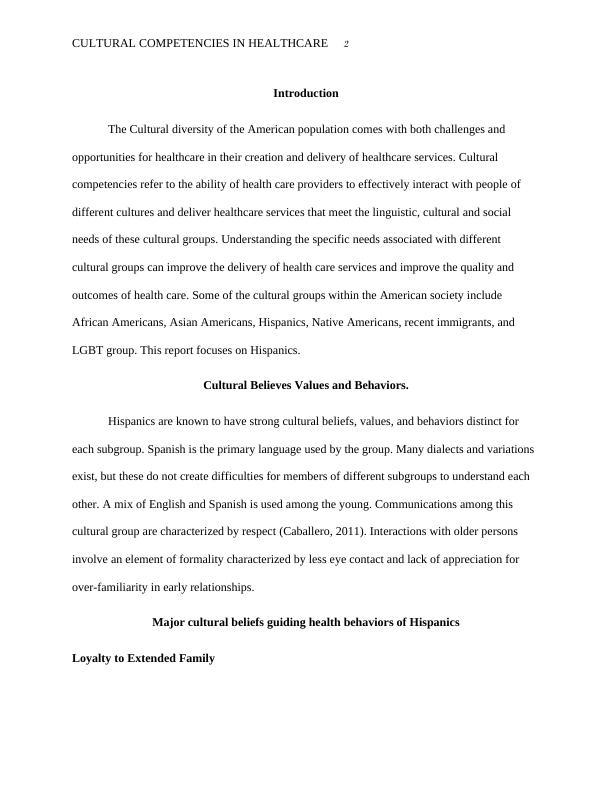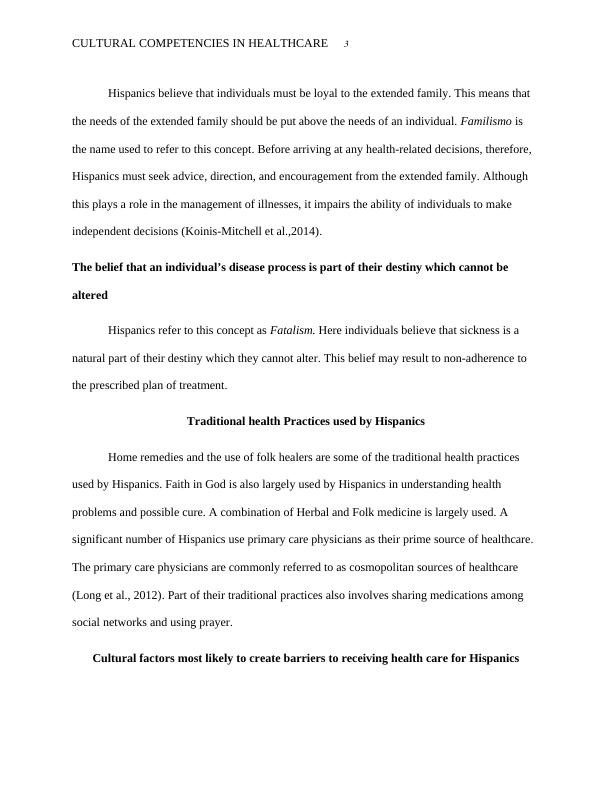Cultural Competencies in Healthcare
Added on 2023-06-04
8 Pages1619 Words194 Views
Running Head: CULTURAL COMPETENCIES IN HEALTHCARE 1
CULTURAL COMPETENCIES IN HEALTHCARE
Name
Institutional Affiliation
CULTURAL COMPETENCIES IN HEALTHCARE
Name
Institutional Affiliation

CULTURAL COMPETENCIES IN HEALTHCARE 2
Introduction
The Cultural diversity of the American population comes with both challenges and
opportunities for healthcare in their creation and delivery of healthcare services. Cultural
competencies refer to the ability of health care providers to effectively interact with people of
different cultures and deliver healthcare services that meet the linguistic, cultural and social
needs of these cultural groups. Understanding the specific needs associated with different
cultural groups can improve the delivery of health care services and improve the quality and
outcomes of health care. Some of the cultural groups within the American society include
African Americans, Asian Americans, Hispanics, Native Americans, recent immigrants, and
LGBT group. This report focuses on Hispanics.
Cultural Believes Values and Behaviors.
Hispanics are known to have strong cultural beliefs, values, and behaviors distinct for
each subgroup. Spanish is the primary language used by the group. Many dialects and variations
exist, but these do not create difficulties for members of different subgroups to understand each
other. A mix of English and Spanish is used among the young. Communications among this
cultural group are characterized by respect (Caballero, 2011). Interactions with older persons
involve an element of formality characterized by less eye contact and lack of appreciation for
over-familiarity in early relationships.
Major cultural beliefs guiding health behaviors of Hispanics
Loyalty to Extended Family
Introduction
The Cultural diversity of the American population comes with both challenges and
opportunities for healthcare in their creation and delivery of healthcare services. Cultural
competencies refer to the ability of health care providers to effectively interact with people of
different cultures and deliver healthcare services that meet the linguistic, cultural and social
needs of these cultural groups. Understanding the specific needs associated with different
cultural groups can improve the delivery of health care services and improve the quality and
outcomes of health care. Some of the cultural groups within the American society include
African Americans, Asian Americans, Hispanics, Native Americans, recent immigrants, and
LGBT group. This report focuses on Hispanics.
Cultural Believes Values and Behaviors.
Hispanics are known to have strong cultural beliefs, values, and behaviors distinct for
each subgroup. Spanish is the primary language used by the group. Many dialects and variations
exist, but these do not create difficulties for members of different subgroups to understand each
other. A mix of English and Spanish is used among the young. Communications among this
cultural group are characterized by respect (Caballero, 2011). Interactions with older persons
involve an element of formality characterized by less eye contact and lack of appreciation for
over-familiarity in early relationships.
Major cultural beliefs guiding health behaviors of Hispanics
Loyalty to Extended Family

CULTURAL COMPETENCIES IN HEALTHCARE 3
Hispanics believe that individuals must be loyal to the extended family. This means that
the needs of the extended family should be put above the needs of an individual. Familismo is
the name used to refer to this concept. Before arriving at any health-related decisions, therefore,
Hispanics must seek advice, direction, and encouragement from the extended family. Although
this plays a role in the management of illnesses, it impairs the ability of individuals to make
independent decisions (Koinis-Mitchell et al.,2014).
The belief that an individual’s disease process is part of their destiny which cannot be
altered
Hispanics refer to this concept as Fatalism. Here individuals believe that sickness is a
natural part of their destiny which they cannot alter. This belief may result to non-adherence to
the prescribed plan of treatment.
Traditional health Practices used by Hispanics
Home remedies and the use of folk healers are some of the traditional health practices
used by Hispanics. Faith in God is also largely used by Hispanics in understanding health
problems and possible cure. A combination of Herbal and Folk medicine is largely used. A
significant number of Hispanics use primary care physicians as their prime source of healthcare.
The primary care physicians are commonly referred to as cosmopolitan sources of healthcare
(Long et al., 2012). Part of their traditional practices also involves sharing medications among
social networks and using prayer.
Cultural factors most likely to create barriers to receiving health care for Hispanics
Hispanics believe that individuals must be loyal to the extended family. This means that
the needs of the extended family should be put above the needs of an individual. Familismo is
the name used to refer to this concept. Before arriving at any health-related decisions, therefore,
Hispanics must seek advice, direction, and encouragement from the extended family. Although
this plays a role in the management of illnesses, it impairs the ability of individuals to make
independent decisions (Koinis-Mitchell et al.,2014).
The belief that an individual’s disease process is part of their destiny which cannot be
altered
Hispanics refer to this concept as Fatalism. Here individuals believe that sickness is a
natural part of their destiny which they cannot alter. This belief may result to non-adherence to
the prescribed plan of treatment.
Traditional health Practices used by Hispanics
Home remedies and the use of folk healers are some of the traditional health practices
used by Hispanics. Faith in God is also largely used by Hispanics in understanding health
problems and possible cure. A combination of Herbal and Folk medicine is largely used. A
significant number of Hispanics use primary care physicians as their prime source of healthcare.
The primary care physicians are commonly referred to as cosmopolitan sources of healthcare
(Long et al., 2012). Part of their traditional practices also involves sharing medications among
social networks and using prayer.
Cultural factors most likely to create barriers to receiving health care for Hispanics

End of preview
Want to access all the pages? Upload your documents or become a member.
Related Documents
Hispanic Culture: Health Beliefs, Family Patterns, Communication Stylelg...
|18
|1652
|169
Cultural Analysis of Native Americanslg...
|14
|3625
|417
Diabetes in a Multicultural Environmentlg...
|3
|543
|121
Cultural Safety in Healthcarelg...
|11
|2878
|13
Nursing Leadership: Ethical Values and Care Coordinationlg...
|7
|1622
|393
Community Assessment and Analysis Presentationlg...
|19
|1041
|85
